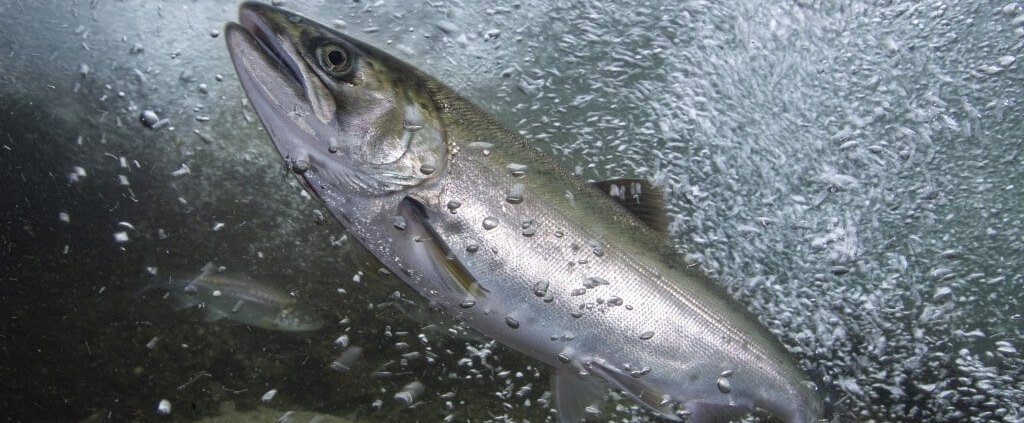PACIFIC SALMON FOUNDATION POSITION ON AQUACULTURE IN BC
News Release
FOR IMMEDIATE RELEASE
May 9th, 2018
The Pacific Salmon Foundation Board of Directors today released the following position on aquaculture in British Columbia:
The Pacific Salmon Foundation (PSF) believes that British Columbia and Canada must put wild Pacific salmon first and that a move to closed-containment salmon aquaculture is recommended. We are taking this position now based on the combination of the information in the recent report of the Ministerial Advisory Committee on Finfish Aquaculture; the results of our own research to date; and the chronically-low abundance of most wild Pacific salmon populations today.
This transition to closed containment will take time but the removal of open net-pen farms along migratory routes of wild Pacific salmon, particularly for those stocks of greatest concern, should occur as soon as possible. During this transition, everything possible should be done to improve the assessment of the risks to wild Pacific salmon, including through the work of the Strategic Salmon Health Initiative that is being done in partnership with PSF, Department of Fisheries and Oceans Canada, and Genome BC.
PSF supports the report of the Ministerial Advisory Committee on Finfish Aquaculture and is prepared to assist the provincial and federal government in the move to closed-containment aquaculture and restoration of wild Pacific salmon.
-30 –
BACKGROUNDER ON CHANGES TO OPEN NET-PEN AQUACULTURE
- The Pacific Salmon Foundation (PSF) is calling for a move to closed-containment salmon aquaculture as the best way to protect wild Pacific salmon.
- This position – approved by the PSF Board of Directors – is based on the potential impacts from open net-pen salmon farms on wild Pacific Salmon.
- For more than 30 years, PSF has followed the development of “sustainable aquaculture” in B.C.’s coastal waters. While changes have been implemented by the industry, concerns about interactions with wild Pacific salmon continue to grow and we see no resolution to them in the short term. PSF has come to its decision for a number of reasons, including:
- the information in the recent report of the Ministerial Advisory Committee on Finfish Aquaculture;
- the results of scientific research to date from the Strategic Salmon Health Initiative it currently has underway with DFO and Genome BC;
- and the critical situation with respect to many wild Pacific salmon populations in southern BC, including Fraser River Sockeye and many Chinook, Coho and Steelhead.
- Because of all of this, PSF believes that open net-pen salmon aquaculture in B.C.’s marine waters poses biological risks to the abundance and diversity of already depleted wild Pacific salmon.
- The approach of waiting for scientific certainty is unrealistic because the potential risks have continually been placed on our wild Pacific salmon. PSF is therefore calling on British Columbia and Canada to put wild Pacific salmon first with respect to the management of these risks. Pacific salmon are invaluable to our province, ecosystems and people.
- PSF recognizes that a full transition to land-based aquaculture will take time, so it is advocating that some actions need to be taken now to minimize risks.
- The first priority should be moving – as soon as possible – the open net-pen farms located along the major migratory routes of wild Pacific salmon, particularly the Fraser River sockeye, as those stocks are of great public concern, have the strongest annual assessment programs to monitor change, and are known to be exposed to farms in Johnstone Strait and Queen Charlotte Sound.
- PSF remains willing to assist the provincial and federal government in advancing the move to closed-containment aquaculture, and more so, in restoring wild Pacific salmon populations.
Contact:
Stephen Bruyneel, Pacific Salmon Foundation, 604 842 1971
About the Pacific Salmon Foundation:
The Pacific Salmon Foundation was created in 1987 as an independent, non-governmental, charitable organization to protect, conserve and rebuild Pacific Salmon populations in British Columbia and the Yukon. The Foundation’s mission is to be the trusted voice for conservation and restoration of wild Pacific salmon and their ecosystems and works to bring salmon back stream by stream through the strategic use of resources and local communities. www.psf.ca
Media Contacts
For media inquiries contact:
Pacific Salmon Foundation
salmon@psf.ca



